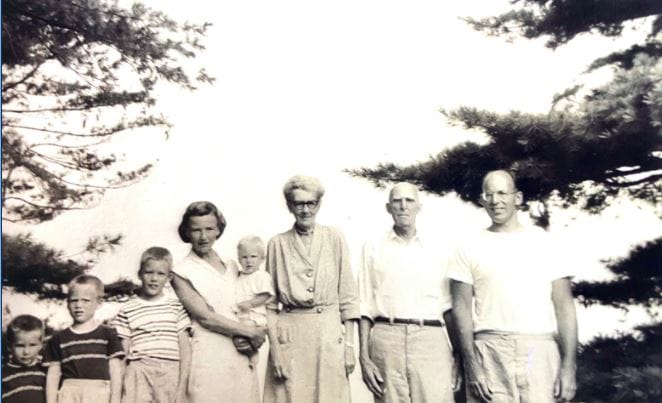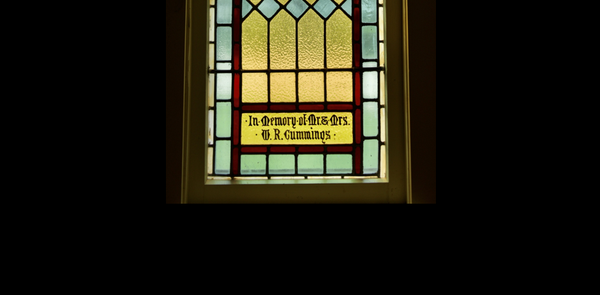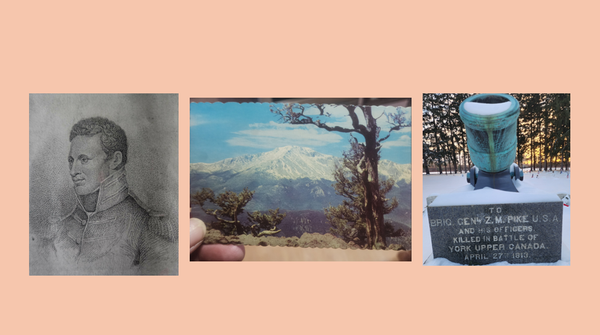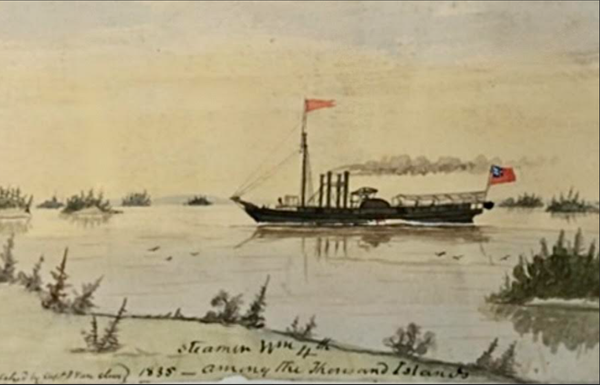Part I: Grandmothers—And Great Aunts—of the Thousand Islands: Frances “Meema” Thompson
by: Callie (Caroline) Quarrier & Hugh Quarrier
“God could not be everywhere, so he created grandmothers.” Proverb
This article is a celebration in honor of the marvelous matriarchs who shaped summers on the St. Lawrence River for generations of their families.
Her grandchildren called her “Meema.” To us, she was "The Grandmother With The Island!"
Born Frances Thompson, “Meema” inherited Ragnavok Island in Chippewa Bay, which had been purchased by her parents in 1889. Married to Archie Belnap Quarrier in 1902, together, they raised three strapping sons, one of whom was my dad.

Frances had spent nearly every summer of her life on Chippewa Bay's Ragnavok, or “Twilight of the Gods.” She and Archie would arrive by sleeper train from New York Central to one of two depots in Hammond, NY. From there, they would be met by carriage, and later by auto, for the trip to Chippewa Bay, where their boatswain would ferry them the mile and a half to the island.

Both Archie and Meema had been brought up in the wealthy turn-of-the-century society of New York City and New Jersey. The manners and rules commensurate with this lifestyle and era came with them to Ragnavok. However, Meema had grown up every summer on the island, and she was enamored with its beauty. She was a skilled swimmer, sailor, and totally bonded to the River.
Archie, on the other hand, merely tolerated country island life for his wife’s sake. Mere tolerance, however, changed to enthusiasm when he began buying and racing Gold Cup boats.

Still, when he was stuck on the island, he would pull out a telescope given to him for viewing freighters. Much to Meema’s consternation, Archie was soon viewing all sorts of goings-on in Chippewa Bay. My aunt said skinny dippers were no longer safe.
“A strong woman looks a challenge in the eye and gives it a wink.” Gina Carey
Apparently, Meema’s taking friends out in her sailing skiff piqued the interest of the telescope’s handler one day. A gust of wind capsized the boat, and all the ladies, in their many skirts, petticoats, blouson tops, and straw hats, careened into the cold water. Luckily, Meema was a skilled swimmer and lifesaver, and she shouted, “Everyone, off with your shoes and clothes. Stay with our boat!”
Archie, not being a very proficient swimmer, watched the whole show, after which he appeared down at the dock to be greeted by what must have been an early version of a wet t-shirt contest. He was not happy that Meema was wet and dressed in only her chemise and bloomers, for all to see!
Archie, Meema, and Telescope!

On several occasions during Meema’s life, she not only spent her summer on Ragnavok but also stayed there well into the late fall, and the extreme cold that heralds winter on the St Lawrence. These were times when she believed that her family and staff would be better protected from the scourge of various diseases, notably the typhoid epidemic of 1906, the influenza pandemic of 1918, and the most recent polio epidemic of 1952, which menaced the areas in the south. Even Archie concurred. Although racing was his passion for living on an island, and business in NYC called, preservation of those he loved, including my immediate family, was paramount.
Life on Ragnavok was extremely formal and structured during Meema’s and Pop’s early tenure. The dress code was voluminous: white dresses and petticoats for the ladies, and bow ties, jackets, and straw hats for the men. Later, the code was relaxed a bit, but I still remember my parents rushing to don coat and tie, cocktail dress, and appropriate footwear, in order to appear for dinner at the main house where only the adults were invited to dine. We grandchildren stayed in the smaller cottage with a babysitter. All our meals were taken there, with one exception. On Sundays, we were invited to be on our best behavior and to have a sumptuous dinner with the grownups--in that order.
Pop rose each morning at approximately the same hour, scarfed down his breakfast, and paced the porch until he could no longer be patient. He would be off to the boathouse to experience his ultimate thrill on Ragnavok--that of starting his boat. The neighbors who liked sleeping in could count on the explosive engines awakening them or Pop’s verbal explosions should his boat not start!
Meema would descend for breakfast a little later. Upon finishing, she would retire to her rooms after consulting with her kitchen staff about the day’s menus and requirements, and instructing them in culinary arts, particularly favorite family dishes. Meema was an expert cook herself. After reaching the privacy of her rooms, she would pull out a stick of gum. “For my digestion,” she would hasten to inform any observers, especially nosey grandchildren. What? My formidable grandmother chewed gum?!
“If God had intended us to follow recipes, he wouldn’t have given us grandmothers.” Linda Henley
Meema left Ragnavok to my Dad. Both she and Archie taught us many skills and always welcomed us for our vacations. Pop enjoyed seeing us - but frequently not hearing us. Meema taught us swimming, boating in canoes, skiffs, and sailboats. And she imparted her love for the St Lawrence to each of us.

When I was about seven, Meema gave me, the oldest of four boys, a small red rowboat with an Evinrude engine attached. She believed that experience was always the best teacher and showed me how to start the engine and steer. She also admonished me to stay within sight of the island at all times. When I was older and more proficient, Meema had her caretaker and boatswain, Henry Hanson (the famous rum runner of the 1930’s), show me how to expertly land a boat along the side of a dock in an unfriendly wind.
The day arrived, and I climbed into Henry’s long, narrow, vessel complete with the secret compartments, rumored to have been used during Prohibition. He gunned the motor and sped away from the dock. He then made a wide arc and raced back, all the while shouting, “grab the gunwales young man and don’t let go!” I did as he asked, but was sure my fingers were about to drop one by one into the watery depths as we slid in next to the dock.
My fingers intact, Henry’s eyes twinkled and he said, “You can do this too!” He had landed perfectly, with maybe one inch between my white knuckles and the dock. Meema obviously trusted Henry implicitly, and I was forever motivated to be just like him.
I certainly had the best teachers on Ragnavok when it came to proficiency in boats; my Dad, Henry Hanson, and most of all, Meema. She was patient, encouraging, and I never saw her lose her temper over anything in the 18 years that I knew her. By the time I was a late teenager, Meema was confident in my water skills.
“Be a strong woman. So your daughter will have a role model and your son will know what to look for in a woman when he’s a man.” Anonymous
One evening, she offered me her boat to attend a neighboring island’s party. My brother Jack and I went off to music, dancing, and unfortunately, a little too much imbibing. In the wee hours, we left to return to Ragnavok, and on the way, I drove Meema’s outboard up over the rocks and sand of a small island. It was an island that I, like every other local boy, knew was there. The crashing, scraping, and subsequent view of the propeller spinning completely out of the water as we sat high and dry, sobered us up quickly. I later heard that the extraordinary ruckus had awakened my parents and Meema. Our neighbors helped us return the significantly damaged boat, and I slunk off to bed and dreaded the next morning.
After breakfast, Meema summoned me to the privacy of her sitting room. “Hugh, my dear, you must not be staring at the girls when you are steering a boat.” That was it. She also gave me a look that was more than sufficient in making me resolve to never again drink while boating. I am sure she was all too aware of the real reason for such an accident.
Sometimes “the look” did not suffice. My cousins from Scow Island, upriver, were older than we four boys, and they would periodically swoop down to Ragnavok in the darkest nights to raid us. They circled the island and shined lights all over while whooping and hollering. Then they would sneak ashore and really become scary, as they crept about in the shadows.
One night they climbed up onto the roof of the main house where Meema and her guests were sleeping. They had also hauled large buckets of cold River water up there. Then they began dancing all over the roof and as Meema, guests, and staff came outside to see what all the commotion was, fountains of ice cold water cascaded over them. Meema never said a word to her son, their father. She didn’t even scold the perpetrators. Rather, she merely submitted a hefty bill to Scow Island for Ragnavok’s new roof!
“Whatever women do they must do twice as well as men to be thought half as good. Luckily, this is not difficult.” Charlotte Whitton
Meema’s legacy to her grandchildren lives on in our care for the River, in our desire to preserve its majesty, and in our need to foster this love in subsequent generations. She gifted each of her family members with this legacy, and we hope to continue what she began.
By Callie (Caroline) Quarrier and W. Hugh Quarrier
Callie (Caroline) Quarrier was a neurosurgical/neurological nurse at Yale New Haven Hospital for 37 years. After spending most of her summers at her grandmother’s home on Mt. Desert Island, Maine, she fell totally in love with the Thousand Islands. She was enchanted to find her future husband had a River island. For nearly fifty years, they have visited every summer. Now they have added a shore home where they spend their winters.
W. Hugh Quarrier is a fifth generation Ragnavok Island resident and is presently serving as the Commodore of the Chippewa Bay Yacht Club. He and his wife, Callie, worked and lived in Connecticut before retiring and moving to the River year-round. They have a winter home in Chippewa Bay, where Hugh spends time working on his passion, History.
See "You Left Out Ragnavok Island," Thousand Islands Life, November 2017.




